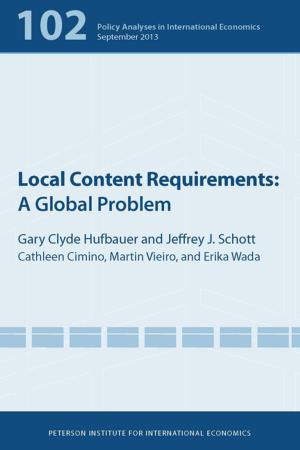Banking's Final Exam
Stress Testing and Bank-Capital Reform
Business & Finance, Economics, Money & Monetary Policy, Finance & Investing, Banks & Banking, Nonfiction, Social & Cultural Studies, Political Science, Politics, Economic Policy| Author: | Morris Goldstein | ISBN: | 9780881327069 |
| Publisher: | Peterson Institute for International Economics | Publication: | May 30, 2017 |
| Imprint: | Peterson Institute for International Economics | Language: | English |
| Author: | Morris Goldstein |
| ISBN: | 9780881327069 |
| Publisher: | Peterson Institute for International Economics |
| Publication: | May 30, 2017 |
| Imprint: | Peterson Institute for International Economics |
| Language: | English |
Spurred by the success of the first stress test of US banks toward the end of the global economic crisis in 2009, stress testing of large financial institutions has become the cornerstone of banking supervision worldwide. The aim of the tests is to determine which banks are adequately capitalized under severe economic shocks and to order corrective measures for those that are vulnerable. In Banking’s Final Exam, one of the world’s leading experts on banking regulation concludes that the tests administered on both sides of the Atlantic suffer from fundamental weaknesses, leading to a false sense of reassurance about the safety and soundness of the banking system. Some weaknesses can be corrected within the existing bank-capital regime, but others will require bold reforms—including higher minimum capital requirements for the largest and most systemically-important banks. The banking industry is likely to resist these reforms, but this book explains why their objections do not hold water.
Spurred by the success of the first stress test of US banks toward the end of the global economic crisis in 2009, stress testing of large financial institutions has become the cornerstone of banking supervision worldwide. The aim of the tests is to determine which banks are adequately capitalized under severe economic shocks and to order corrective measures for those that are vulnerable. In Banking’s Final Exam, one of the world’s leading experts on banking regulation concludes that the tests administered on both sides of the Atlantic suffer from fundamental weaknesses, leading to a false sense of reassurance about the safety and soundness of the banking system. Some weaknesses can be corrected within the existing bank-capital regime, but others will require bold reforms—including higher minimum capital requirements for the largest and most systemically-important banks. The banking industry is likely to resist these reforms, but this book explains why their objections do not hold water.















